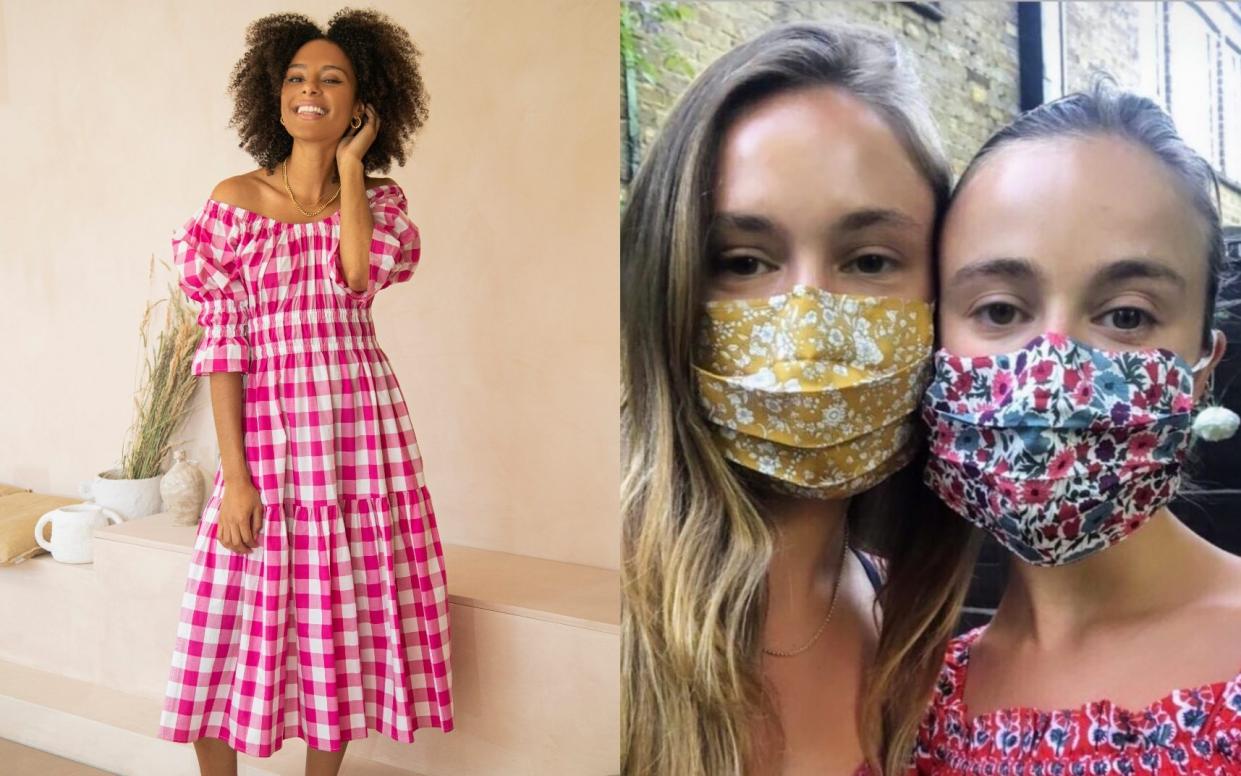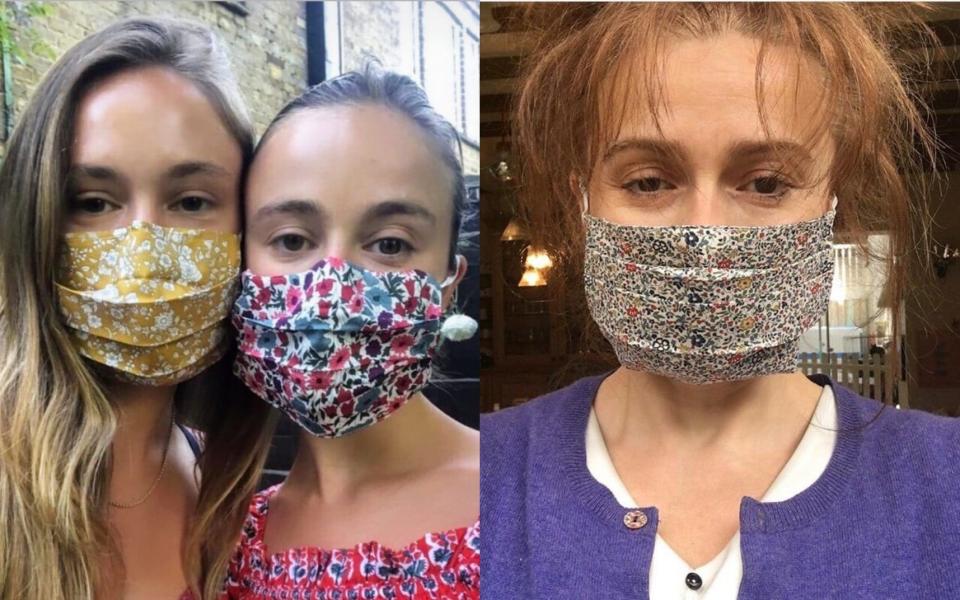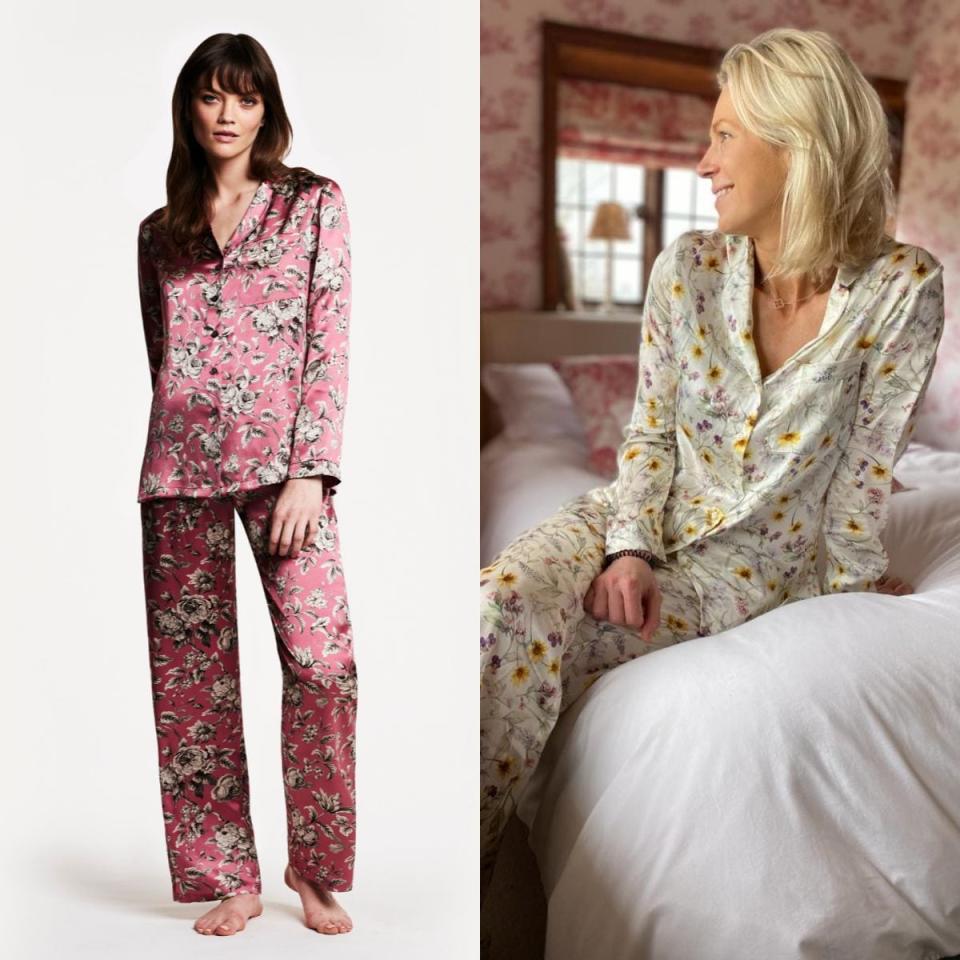How 5 fashion labels transformed to survive lockdown

News in the retail sector is gloomy right now, with headlines about falling sales and much-loved brands going into administration. But some small businesses have been clever and nimble enough to make the best of extraordinary circumstances...
Otiumberg

Solid gold personalised name bracelet, £550; Vermeil name bracelet, £140; Oval huggies, from £60-£140, all Otiumberg
As chosen by Lisa Armstrong
When the UK went into lockdown, 31-year-old Rosanna and 35-year-old Christie Wollenberg, the sister-duo behind Otiumberg, the stylishly understated source of irresistibly pretty jewellery, had three hours to clear their new showroom of stock.
“I ended up moving hundreds of thousands of pounds worth of jewellery to my small flat in south London without proper insurance. It was either that or lose access to it and we didn’t know how long that would be for,” recounts Rosanna. Fortunately, because they specialise in small, delicate pieces, the haul was relatively compact. “It was quite the dilemma – for weeks I was so worried about a break-in, I didn’t leave home.”
What could have been overwhelming, soon became a positive. Without access to the new showroom they’d signed the lease on in January, or the models they used for their images, the sisters were thrown back on more homely means of engagement. They began offering style consultations via FaceTime, Zoom or WhatsApp, and started photographing new collections on themselves. “We’ve always been quite reticent about putting ourselves at the forefront of the brand," says Rosanna. “But lockdown reminded us how much customers like to see the people behind the label.”
Other lessons: sustainability is non-negotiable. “We knew that already. One reason we love jewellery is that it doesn’t date. But lockdown allowed us to step back and think it through.” They’ve eliminated plastic, substituting with biodegradable cellulose. Otiumberg was born because the Wollenbergs couldn’t find what they wanted – eclectic pieces that can be mixed and matched. Designs are mostly nine carat gold, often customised with an array of tiny pearl or topaz encrusted charms, accessibly priced at between £150-300, but still an investment. For customers on a tighter budget, they offer vermeil on silver.
“The other thing we amped up in lockdown is our replating service. For as little as £25 you can get something replated, so you never have to throw it away.” They also did a roaring trade in engraved name bracelets. “That came from Christie, who has two tiny children and wanted their names on her wrist.” Business is up 130 per cent on this time a year ago. “The really lovely thing is how much repeat business we get – and the emails we’ve had from our engravers thanking us for the work.”
Brora

Face mask, £19, Brora
As chosen by Bethan Holt
Segueing from luxe knitwear to masks may not seem like the most natural move for a fashion business, but then nothing about the past few months has felt very “natural”. “The first masks I made were for my family and friends and they seemed to be very keen on them,” recalls Victoria Stapleton, the founder of Brora, who was first inspired to create face coverings by her sister, who was sewing them for care homes in Normandy. “When I was next in the office my head of buying told me that one of our factories in Portugal was making PPE and that is how the Brora face mask journey began.”
Once Stapleton realised that her masks could become more than a kitchen-table venture, she knew that she wanted to give her new product category, made from pretty Liberty fabrics, a charitable element. “I was inspired by Captain Sir Thomas Moore and wanted to do our bit as a proudly British business to help the NHS and other charities during the pandemic,” she says of the project, which has now raised more than £100,000 for NHS Charities Together.
Brora’s £19 masks (£10 of which is donated) were some of the earliest stylish options available to buy and have been worn by the likes of Helena Bonham Carter and Amelia Windsor. The initial order of 1,500 sold out in hours and once the £100,000 target was reached, Stapleton decided to widen the scope. “Now we are donating £5,000 every few days to other charities chosen by the team at Brora, all of which are making such a difference for those affected by Covid-19,” she explains.
“Food banks, mental health charities and the BAME community have been severely impacted by the pandemic and I felt it was vital to support some of the smaller charities. It is, of course, ironic that out of something so horrific, we have managed to create something for the good.
“It feels like something positive has come out of these last few months and certainly our customers are to be thanked too, for getting behind the project. We are still selling hundreds each week.”
Ridley London

Silk satin pyjamas, from £279, Ridley London
As chosen by Bethan Holt
While some of us spent February and early March in denial, Camilla Ridley began preparing for a vastly different spring and summer early. “We were aware ahead of time that lockdown was coming because we were closely following developments and thanks to regular updates from friends in cities like Milan, Madrid and Paris, we knew what to expect and had a small window to make some early decisions and vital preparations,” she remembers.
The biggest issue – aside from having to close her store in Barnes, preparing to furlough staff and ensuring that her seamstresses were set up to work at home – was what to do with the beautiful fabrics that had been poised to be turned into occasion wear for the summer season. As Ridley creates pieces on a made-to-order basis, luckily she had time to rethink.
“We developed new capsule collections made from many of the silks and cottons we already had,” she explains. “First of all we launched a luxurious loungewear collection for lockdown, with profits donated to the UK charity Re-engage to support the mental health of thousands of vulnerable elderly through this period. And more recently, a new relaxed collection of easy and flattering sun dresses.”
Instead of more formal designs Ridley’s new versatile hero pieces, like the Savanna sundress and tiered Mathilde mini, have played into this summer’s unexpected picnic-chic mood and are selling well – some brides have even ordered laid-back dresses for their scaled-down weddings. Because online sales are up, Ridley is also working on upgrading her website store.
Now the Barnes boutique is open again, Ridley has focused on making the shopping experience as enjoyable as possible as well as incorporating above-and-beyond safety measures like staff antibody testing and out-of hour-appointments. “The one advantage small businesses like ours have is an ability to quickly flex and adapt to changing conditions and to survive,” notes Ridley. “It’s absolutely crucial we do whatever we can to offer a more relevant collection, an improved service and enable customers to shop in comfort and with confidence.”
Rixo

As chosen by Emily Cronin
Early in lockdown, Rixo co-founders Henrietta Rix and Orlagh McCloskey realised they had a problem. Or rather, 20 problems – the number of new-season styles that hadn’t been photographed and which were just sitting in their warehouse. Those mixed-print silk dresses, side-slit skirts and cocktail handbags had company in the form of excess merchandise from cancelled wholesale orders, leading to a 74 percent stock increase and a warehouse full of un-shot, or yet to be photographed – ergo unsaleable – stock.
“You can’t really launch a product with just a flat shot,” Rix says. “Our customer needs to see how it looks on and get a feel for it.”
With no scope to produce a shoot to pre-lockdown standards, they invited friends, influencers, loyal customers and NHS and care workers to choose gifts from the pool of un-shot pieces. “We just said, look, here’s a dress. If you have time to shoot it, great. If not, here’s a nice dress for you to wear and brighten your day.”
They’ve sent out 150 such gifts since mid-March. The result is a collection of spontaneous-feeling, shot-at-home images. In place of sterile photo-studio backdrops, they’re situated in the lounges, back gardens and kitchens that constituted the extent of each locked-down woman’s world. For most recipients, receiving a new Rixo dress likely represented the most exciting event of their week (or month) - naturally they were keen to share. One even captioned her Instagram post, “Dressing up to go to the sofa.”
A post shared by RIXO (@rixo) on Jul 10, 2020 at 2:48am PDT
The approach translated into sales - the brand’s best-selling styles of the past few months have been from the patchwork print collection, as seen on in-house creative lead Ana Orozco (she posed in her dining room and in Rix’s back garden). “As soon as we put the pieces live on the site, they started to fly out,” she says. In fact, the series proved so successful that Rix has decided to design the brand’s new in-office photo studio in the style of a home, to try to retain the “real and relatable” feel of their lockdown shoots.
The crowdsourced lookbook resonated because each image reflected the circumscribed terms of all of our locked-down lives, rather than some glamorised ideal. “It just worked,” Rix says. “There were a million problems facing us, and we knew we had to stay positive. Being real helped us.”
Kitri

Pink midi, £145; Green midi, £145, both available to pre-order at Kitri
As chosen by Tamara Abraham
Kitri founder Haeni Kim had actually been toying with the pre-order concept for almost a year – the fact that she made the switch during lockdown was purely because it afforded her the time to ask whether her business was as sustainable as it could be, and how well it was meeting the demands of shoppers.
She and her team agreed that pre-orders would help reduce their environmental impact as well as some of the uncertainty that is inherent in any fashion company. “It’s incredibly unpredictable as to what our customers are looking for, or how long a certain type of a product is going to be in demand for. All of that was thrown up in the air at the beginning of March,” she says.
“Rather than trying to predict what our customers are going to want and produce things in advance that we can only be about 70 per cent right on, we thought, why don’t we speak to our customers about what they want ahead of time?”
A post shared by KITRI (@kitristudio) on Jun 27, 2020 at 7:01am PDT
For those who don’t want to wait for the brand’s latest hero dresses, new stock will land on the website as usual, but in very limited quantities. If they sell out fast – Kitri’s current must-have, the green gingham Margot dress, sold out within hours – they will be made available for pre-order for a limited period of time or until fabric supplies run out. Then your purchase will effectively be made-to-order and delivered between three and five weeks.
In doing this, Kitri is able to limit the amount of stock that ends up in storage or on sale. It also encourages a more mindful kind of shopping that is the antithesis of fast fashion. “You can look at our pre-order page to see if there’s something that you wouldn’t mind waiting a couple of weeks for,” Kim says. “It gives you an opportunity to think about whether you really love that style and just be a little bit more mindful about your purchase. I think that that can only be a good thing.”
For more news, analysis and advice from The Telegraph's fashion desk, click here to sign up to get our weekly newsletter, straight to your inbox every Friday. Follow our Instagram @Telegraphfashion


